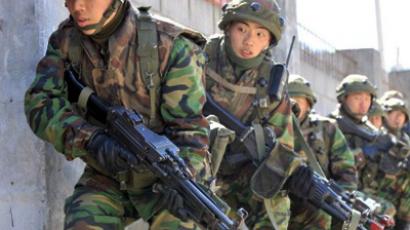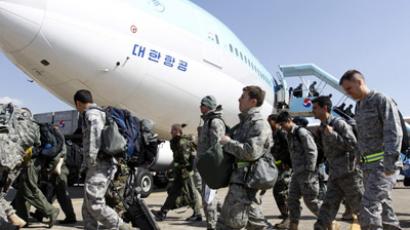N. Korea to halt nuke enrichment, missile tests – US
North Korea says it is ready to halt missiles tests, disable its nuclear reactors and allow IAEA observers into the country in exchange for a food aid package from the US.
US state department spokesman Victoria Nuland confirmed on Wednesday that North Korea had agreed to meet demands to disable its nuclear reactors at Yongbyon. The US said the decision to resume food aid is linked to progress in talks on suspension of North Korea’s nuclear program. This contradicts the official policy of the US, which states that food aid is not linked to Pyongyang’s nuclear ambitions. The US says it will send a 240,000-metric-ton food aid package to North Korea if Pyongyang stops its nuclear tests. The US made the offer last week during talks in Beijing. Once specialists from the International Atomic Energy Agency have inspected uranium enrichment facilities, the deal can be finalized, the US says. Moscow has praised the efforts of all parties to revive the six party talks. “Russia approves dialogue between any members of the six-party talks, including bilateral as well as any steps taken towards resuming the talks and stabilizing the situation at the Korean peninsula,” a source in the Russian Foreign Ministry said.Asia expert Aleksandr Zhebin told Russia's Interfax news agency that North Korea has made a huge concession.“On the 15th of April North Korea will be celebrating the 100-year anniversary of Kim Il-sung. The country’s leadership wants to greet this holiday not only with weapons but also with the US ready to provide food aid.”Last weeks talks in Beijing, which stretched over two days, did not yield an immediate result. However they were said to be “serious and substantive.” The US said last week it wanted to hear out the position of North Korea’s new leader on giving up nuclear weapons. The long-term goal was to resume the six-party talks. In 2009, the IAEA inspectors were asked to leave Yongbyon after six-party talks broke down.While working on its nuclear program North Korea has been unable to feed its people and has relied on international aid.
'Food shortage not No.1 priority for deal'
Erich Weingartner, a Canadian humanitarian affairs consultant, believes the food shortage and leadership change in North Korea are not primary driving forces behind the agreement. “The country’s always short of food,” he noted in an interview with RT, “Right now probably not as desperately in need as it was a year ago. They have just received in January some 500,000 tons of food from China, so this is not the number one priority for the particular action that’s happening right now.”Weingartner also pointed to the fact that the agreement was actually discussed by the US and North Korea prior to Kim Jong Il’s death. However, he also noted that the present deal is not a formal agreement, but is more in line with what North Korea likes to call “words for words” and “actions for actions.”“So it depends not only on North Korea and what they do, but it also depends on how the US is going to react in the next period of time and whether or not the six-party talks process gets back on track, and what happens in that regard.”He said the other five parties, namely South Korea, China, Russia, Japan and the United States, had to do their part in the negotiations. As for the drills recently conducted by the US and South Korea, Weingartner took note of the fact that North Korea isn’t the only cause of concern for America in the region. “The drills are an annual event and have to do partly with North Korea and the threat from North Korea, but also partly the US asserting its power in the region. And so it has as much to do with the US facing China and protecting its allies in Northeast Asia, as well as protecting economic interests there.” He said China was not likely to appreciate the exercises.
‘North Korea hasn’t drastically changed its stance’
Christine Hong, a fellow at the Korea Policy Institute and professor of Asian-American and Critical Pacific Rim Studies at UC Santa Cruz, noted that the agreement was not a drastic change in North Korea’s stance. “For many decades North Korea has pursued the possibility of a peace process with the United States. It has been very consistent in that,” Hong told RT. She said North Korea could give up its nuclear ambitions entirely if sanctions are lifted, as it would then get the opportunity to obtain much-needed international loans, allowing it to join global economic community. “When it comes to North Korea’s nuclear ambitions it’s all part and parcel of the fact that North Korea has been in a virtually untenable, almost sort of existential crisis for the past 60 years,” she noted. “North Korea would only give up its nuclear ambitions for a normalized role on the world stage.”














